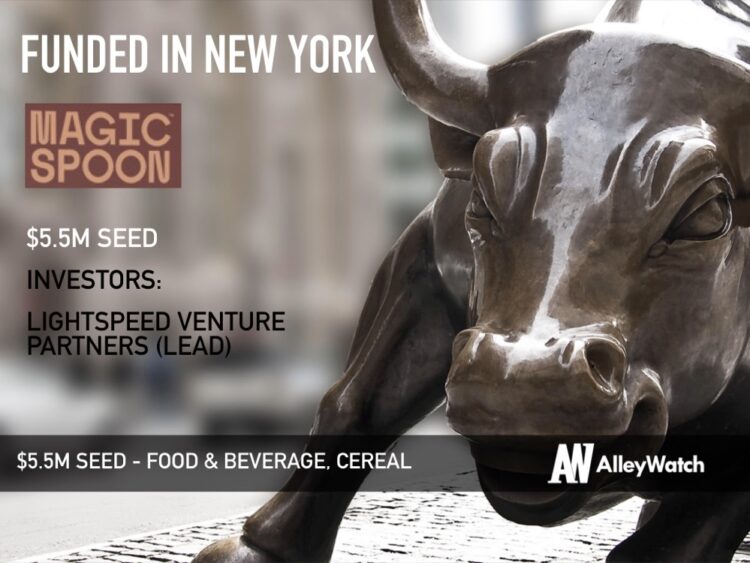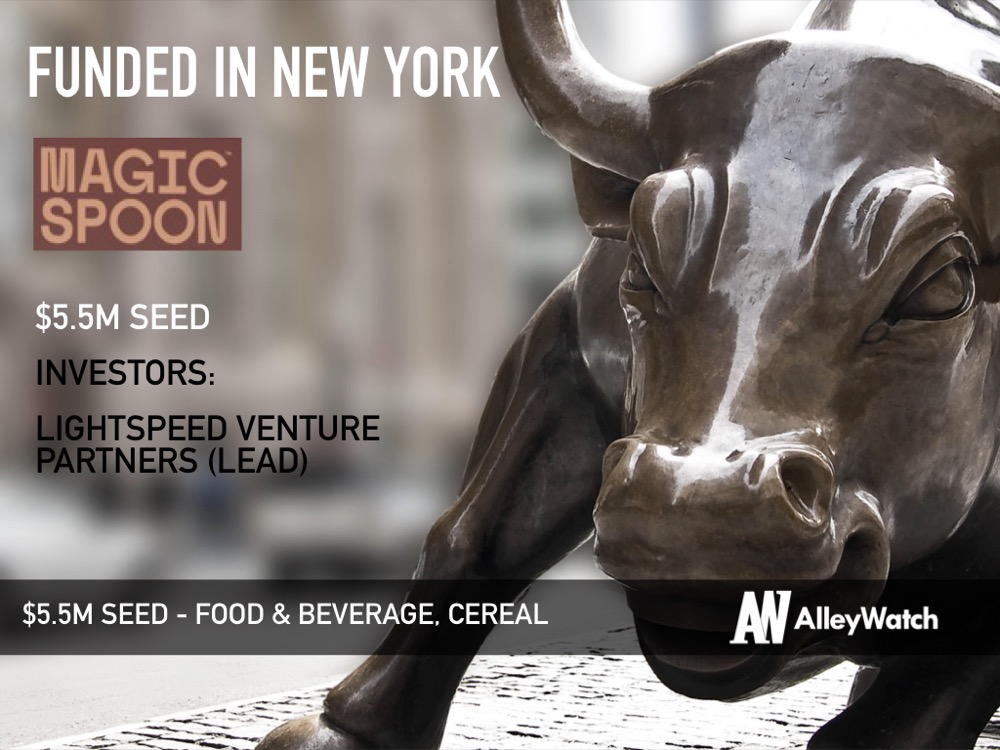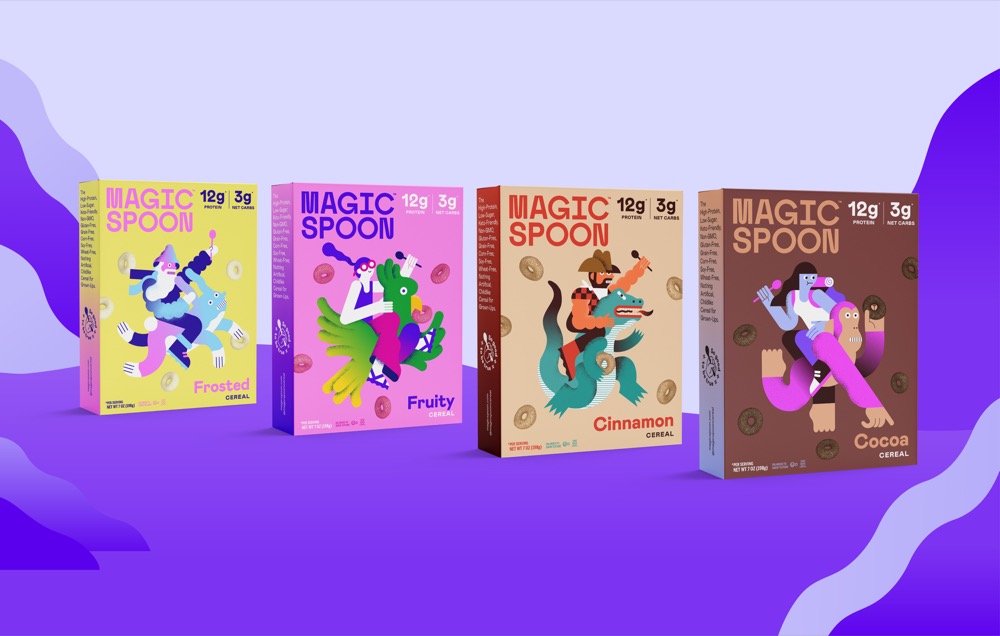Remember waking up on Saturdays when you were a kid and having a big bowl of sugary cereal while watching cartoons? For most of us, adulthood and our waistlines do not offer us the liberty to eat like any longer. But Magic Spoon is the fun-loving cereal direct-to-consumer brand for adults that reinvents childhood classics with flavors like Cinnamon, Frosted, Fruity, and Cocoa, while balancing nutrition and taste. Available either via monthly-subscriptions or as a one time purchase, the cereals come out to a total of 110 calories, 12g complete protein, gluten-free, and only 3 grams of net carbs per bowl.
Dig into this exclusive AlleyWatch interview with foodtech serial or cereal entrepreneurs Gabi Lewis and Greg Sewitz (the duo founded and exited cricket protein brand EXO), to learn more about how Magic Spoon is stirring up the cereal market, the company’s future growth plans, and recent round of funding.
Who were your investors and how much did you raise?
We raised a $5.5M Seed round led by Lightspeed Venture Partners. Other investors participating in this round include Collaborative Fund, Wild Ventures, DGNL Ventures, Nebari Ventures, Joey Zwillinger (cofounder of Allbirds), Jeff Raider (cofounder of Harry’s), Dave Gilboa & Neil Blumenthal (cofounders of Warby Parker), Moiz Ali (founder of Native), Michael and Daniel Broukhim (cofounders of FabFitFun), Questlove (musician), Rick Rubin (legendary music producer), Kevin Rose (founder of Digg and host of The Kevin Rose Show) and Peter Attia (founder of Attia Medical).
Tell us about the product or service that Magic Spoon offers.
Magic Spoon reimagines America’s favorite childhood breakfast into a delicious, high-protein, low-carb, guilt-free indulgence. With no gluten or grains, 12g complete protein, 110 calories, and only 3 grams of net carbs in every bowl, Magic Spoon elevates the modern cereal experience with every spoonful. Flavors include Cinnamon, Frosted, Fruity, or Cocoa, available via monthly subscription or one-time purchase.
What inspired you to start Magic Spoon?
Everyone loves cereal – but it’s not the healthiest option. It’s taken 120+ years for cereal to crack the healthy and delicious code. As society became more health-conscious in recent years, cereal evolved into a polar opposite of its sugar-filled predecessor: healthy cereal with bland flavors, muted colors, and the disappearance of the joy one felt as a kid eating cereal on a Saturday morning watching cartoons. This, along with our personal love of the crunchy breakfast meal, inspired us to create Magic Spoon as a way to allow people to enjoy cereal without sacrificing nutrition.
How is Magic Spoon different?
Magic Spoon identified a large gap in the cereal market: some brands prioritize taste, and others nutrition – but we have yet to see a brand that has mastered both. Even more so, Magic Spoon implemented a monthly subscription-based option, something that was majorly lacking in the cereal market, given that technological growth has pushed consumers to primarily shop online – even for food. The direct-to-consumer model allows us to have a direct relationship with our customers, quickly iterate on products due to feedback and be more nimble in our approach to product development. Magic Spoon has also tapped into the nostalgic appetite of the millennial consumer, bringing back fun characters and colors to their branding.
How has your experience with Exo shaped the trajectory of this venture?
In many ways, our experience with Exo was the opposite journey. With Exo, we were introducing something really novel (cricket protein), starting with the most extreme early adopters, and pushing hard towards mainstream acceptance. Here, we’re taking one of the most beloved and largest categories in the grocery store, cereal, and reinventing it for modern consumers. There’s definitely lots of overlap in terms of the tactics we’re employing –influencer marketing, for example, was huge for us at Exo and is key this time around too.
What market does Magic Spoon target and how big is it?
The breakfast cereal market is $11B domestically and $37B globally. Magic Spoon targets millennials, like ourselves, in addition to all cereal lovers seeking a healthier option. It’s been really incredible to see how far and wide Magic Spoon has reached, from the health-minded consumer to parents looking to provide their kids with a better breakfast option – without removing the fun.
What’s your business model?
We are direct-to-consumer business, with a focus on subscription.
What was the funding process like?
Thankfully, we’ve gone through the funding process quite a few times before, so it was pretty straightforward this time around. We just spoke to a handful of investors who we’d either known ourselves for many years, or who were highly recommended by existing investors, and it was a fast and smooth process.
What are the biggest challenges that you faced while raising capital?
For high-growth food and beverage companies, there’s always a question around whether to raise from traditional food investors or tech investors. We’re excited to have found some amazing investors who straddle both worlds, as well as angels with deep experience building incredible brands online.
What factors about your business led your investors to write the check?
Cereal is an absolutely enormous market that’s seen little to no innovation in decades. The opportunity to re-define such a large and beloved category was compelling to investors, as well as the traction and brand we’ve built so far. We’ve also known many of our investors for many years, and so the level of trust that comes from that depth of relationship was also a major factor.
The opportunity to re-define such a large and beloved category was compelling to investors, as well as the traction and brand we’ve built so far. We’ve also known many of our investors for many years, and so the level of trust that comes from that depth of relationship was also a major factor.
What are the milestones you plan to achieve in the next six months?
This round will help to fuel company growth as we continue to build a world-class team, as well as drive innovation through the debut of new products and formulations in the months to come. We plan to scale operations, develop new flavors, and invest in our team.
What advice can you offer companies in New York that do not have a fresh injection of capital in the bank?
Stay focused on making sure you have a really good product that a lot of people passionately love!
Where do you see the company going now over the near term?
Right now we’re focused on building our direct-to-consumer business, while honing in on the subscription component. We’ll be releasing new flavors in the near future and eventually will look to move into retail stores.
What’s your favorite restaurant in the city?
Gabi: Ugly Baby.
Greg: Ops.





